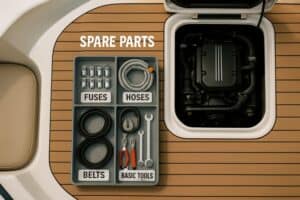Key Takeaways:
- Essential spare parts onboard ensure safety and prevent costly emergencies.
- Core items include batteries, fuses, belts, hoses, impellers, and seacocks.
- Organize parts with proper tools for quick, effective repairs.
- Regular inspection and proper storage prevent failures and damage.
- Know when to call a professional for complex repairs.
Why Keeping Spare Parts Onboard Matters
Boating offers exhilarating freedom, but moments on the water can quickly become stressful if caught unprepared. Whether you’re venturing out for a relaxing afternoon cruise or a long offshore excursion, mechanical and electrical issues tend to strike when least expected. Critical systems—like bilge pumps, engine cooling, or navigation lighting—can fail suddenly, and not having a way to fix even minor problems can put your trip and safety at risk. If you lack essential spare parts, minor issues can lead to expensive towing fees, lengthy trips to the repair shop, or even hazardous situations. These emergencies can often be resolved with something as simple as a replacement fuse, hose, or an Attwood replacement parts kit designed specifically for your vessel. Having these onboard, organized, and easily accessible can turn a potential mishap into a minor inconvenience rather than a trip-ending crisis.
Core Spare Parts Every Vessel Needs
Certain spare parts are non-negotiable, regardless of your boat type. Ensuring you have these spare components can make all the difference if something fails while you’re out on the water:
- Batteries and electrical fuses: Keep spare fuses and at least one backup battery for critical systems and start-up functions.
- Belts, hoses, and clamps: Engine belts and hoses are prone to wear and tear. Spares ensure you’re ready for leaks or failures that would otherwise strand you.
- Impellers and water pump components: An impeller failure can cause rapid overheating and engine damage. Always carry spares, installation tools, and instructions.
- Seacocks and through-hull fittings: Leaky or broken through-hull fittings can lead to dangerous situations. Replacement parts help you stop leaks quickly.

Creating a Custom Spare Parts Kit
Every boat is different, and a custom spare parts kit ensures you’re covered for your particular model and typical usage. Begin by consulting your owner’s manual and seeking advice from your boat manufacturer or trusted mechanic. List out all essential systems—engine type, electrical configuration, plumbing, and navigation aids—and note part numbers for every replaceable component.
Organization is key: Use durable storage bins or tackle boxes and label each section for fast identification during an emergency. Rely on input from experienced mechanics who understand your specific boat, as they can recommend less obvious but equally critical parts to include, such as fuel filters or oil seals.
Tools and Accessories That Complement Your Spare Parts
Spare parts are only useful if you have the tools to install them. Every boat owner should carry a multipurpose toolkit that includes screwdrivers, wrenches, pliers, cutters, and adjustable spanners. Electrical tape, marine sealants, and waterproof lubricants are non-negotiable extras for secure repairs on the fly.
In addition, keep handheld meters and basic diagnostic devices handy. A voltage meter can help track down electrical issues, and a fuel pressure tester aids in engine troubleshooting. Quality tools reduce repair time and increase your confidence to tackle most emergencies on the water.
How Often Should You Replace or Inspect Spare Parts?
Following the manufacturer’s recommendations and your mechanic’s guidance is the best way to ensure reliability. Many parts, such as impellers and hoses, have a predictable lifespan—so schedule routine checks and replacement intervals.
Create a seasonal checklist. Inspect parts at the start and end of the boating season, and after any lengthy trip. Technology, such as smartphone reminder apps and digital maintenance logs, makes tracking inspection dates easier. Stay ahead of issues to avoid inopportune failures out on the water.
Organizing Spare Parts for Quick Access
The difference between a smooth repair and a stressful delay is how you store and organize spare parts. Use compartmentalized containers to prevent clutter, and label everything clearly in waterproof ink. Soft-sided toolbags with multiple pockets are ideal for tight storage spaces.
Moisture control is crucial: Include silica gel packets or moisture-absorbing products inside each storage box to prevent corrosion, mold, and rust. Place more sensitive items—such as electronics or gaskets—in sealed plastic bags for extra protection. Experienced boaters recommend reviewing the kit regularly and replenishing supplies after each use.
When to Seek Professional Help Instead of DIY Repairs
Not every boat repair is suitable for DIY, even with the best spare parts available. Professionals should handle complex issues—such as fuel injection problems, advanced electronics, or hull damage. If troubleshooting feels beyond your comfort level, or if attempted repairs worsen the issue, it’s better to contact a marine technician and prioritize the safety of everyone onboard.
Technology is making preventative maintenance easier, helping you monitor systems and spot potential failures before they happen. Modern troubleshooting tools, wireless monitoring, and integrated technology systems allow boaters to detect trouble immediately, minimizing the risk of emergency repairs while offshore.
Peace of Mind Through Preparation
Peace of mind on the water comes from knowing your boat is ready for anything. A carefully curated spare parts kit, backed by the right tools and organization strategy, turns emergencies into manageable moments. Take time to assess your vessel’s needs each season, and regularly update and restock your kit based on your boating habits.
Share your spare parts list and storage solutions with your boating community—these knowledge exchanges help everyone enjoy safer, more reliable adventures. Thoughtful preparation isn’t just smart; it’s one of the best ways to maximize enjoyment and confidence every time you set sail.






